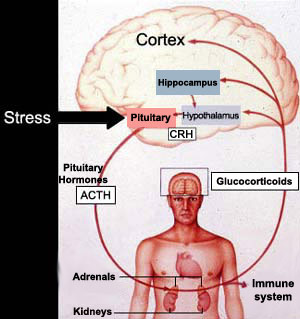Urology. 2008 Feb;71(2):261-266.
Adrenocortical Hormone Abnormalities in Men with Chronic Prostatitis/Chronic Pelvic Pain Syndrome.
Dimitrakov J, Joffe HV, Soldin SJ, Bolus R, Buffington CA, Nickel JC.
Harvard Urological Diseases Research Center, Children’s Hospital Boston, Boston, Massachusetts; Harvard Medical School, Boston, Massachusetts.
OBJECTIVES: To identify adrenocortical hormone abnormalities as indicators of endocrine dysfunction in chronic prostatitis/chronic pelvic pain syndrome (CP/CPPS).
METHODS: We simultaneously measured the serum concentrations of 12 steroids in patients with CP/CPPS and controls, using isotope dilution liquid chromatography, followed by atmospheric pressure photospray ionization and tandem mass spectrometry.
RESULTS: We evaluated 27 patients with CP/CPPS and 29 age-matched asymptomatic healthy controls. In the mineralocorticoid pathway, progesterone was significantly greater, and the corticosterone and aldosterone concentrations were significantly lower, in the patients with CP/CPPS than in the controls. In the glucocorticoid pathway, 11-deoxycortisol was significantly lower and the cortisol concentrations were not different between the patients and controls. In the sex steroid pathway, the androstenedione and testosterone concentrations were significantly greater in those with CP/CPPS than in the controls. The estradiol, dehydroepiandrosterone, and dehydroepiandrosterone sulfate concentrations were not different between the patients and controls. The National Institutes of Health-Chronic Prostatitis Symptom Index total and pain domain scores correlated positively with the 17-hydroxyprogesterone and aldosterone (P <0.001) and negatively with the cortisol (P <0.001) concentrations.
CONCLUSIONS: Our results suggest reduced activity of CYP21A2 (P450c21), the enzyme that converts progesterone to corticosterone and 17-hydroxyprogesterone to 11-deoxycortisol. Furthermore, these results provide insights into the biologic basis of CP/CPPS. Follow-up studies should explore the possibility that patients with CP/CPPS meet the diagnostic criteria for nonclassic congenital adrenal hyperplasia and whether the hormonal findings improve or worsen in parallel with symptom severity.
PMID: 18308097 [PubMed - as supplied by publisher]

UPDATE IN 2009:
FULL TEXT OF STUDY




